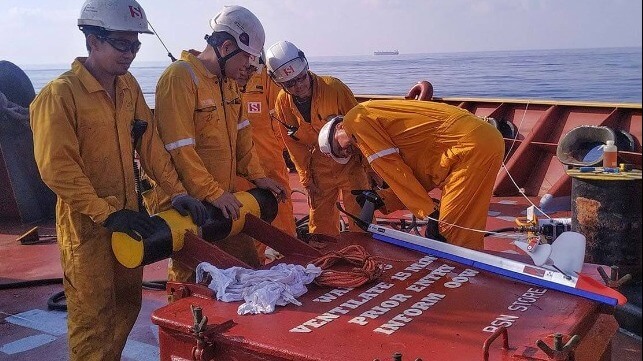Stolt Tankers Expands Fleet Application of Shipshave’s ITCH™

[By: Shipshave]
Stolt Tankers is expanding implementation of Shipshave’s In-Transit Cleaning of Hulls (ITCH) solution across its fleet after seeing significant fuel savings of over 10% from initial trials of the innovative technology to boost energy efficiency, reduce its carbon footprint and cut emission costs.
As the world’s largest operator of chemical tankers, Stolt Tankers is adopting a range of technologies to enhance the sustainability of its fleet towards the goal of reducing the carbon intensity of its ship operations by 50% by 2030, compared with a 2008 baseline, as part of wider efforts to curb marine pollution.
Among these initiatives is the ITCH that contributes to improving the energy efficiency of existing vessels amid rising fuel expenses and new regulations for shipping such as the EU Emissions Trading System (EU ETS) that will result in higher fuel-related costs due to the need to compensate for emissions.
“We see proactive hull cleaning as a simple way to achieve rapid emission cuts at relatively low cost. The ITCH has therefore become an important technology in our toolbox after piloting the system on the Stolt Acer, along with five other ships, that yielded reductions in fuel consumption exceeding 10%,” says Stolt Tankers’ Energy and Conservation Manager Jose Gonzalez Celis.
Maintaining hull performance
Consequently, the Norwegian shipowner is expanding application of the technology on its fleet by doubling its tally of units to 20, which will allow it to deploy the recently upgraded ITCH on a commensurate number of ships.
Gonzalez Celis points out that regular proactive cleaning of the ship’s hull to prevent the build-up of marine biofouling “is about maintaining the hull in a consistently good condition to minimise drag for optimal performance to avoid overconsumption, rather than measuring large improvements every time the hull is cleaned periodically”.
As well as emissions reduction, there are other environmental benefits from preventive hull cleaning as it avoids the transport of invasive species between ports that can affect coastal ecosystems and prevents deposits of biocide and plastic residues caused by erosion of anti-fouling coatings with heavy-duty cleaning in port, according to Stolt Tankers.
Stolt Tankers is also trialling GIT graphene coatings on hulls and propellers, which improve fuel efficiency through the reduction of biofouling. These coatings are free of biocides, toxic chemicals and plastics. The company has introduced several other anti-pollution initiatives that help to protect the marine ecosystem in line with its sustainability goals.
Curbing drag, cutting emissions
According to the IMO’s GloFouling research, a 0.5mm slime layer covering up to 50% of a hull’s surface could trigger an increase in emissions of 25% - or as much as 60% with a light layer of barnacles - dependent on ship characteristics and speed.
Stolt Tankers is therefore taking a proactive approach by keeping the hull clean while in transit, as opposed to the conventional industry method of reactive cleaning typically carried out either in port or dry dock that can result in increased costs, downtime and marine pollution, as well as safety issues with use of divers.
This is made possible by the ITCH, a semi-autonomous hull cleaning robot - deployed by the crew from a portable winch mounted on the forecastle deck - that swipes up and down the hull underwater using soft brushes to gently remove biofouling during a voyage and thereby maintain hull performance.
Shipshave estimates the ITCH can clean between 80-90% of the parallel/vertical area of a vessel hull in a five-hour operation while in transit, with typical opex of less than $250 per cleaning.
Stolt Tankers’ findings from using the ITCH in real-life operations support classification society DNV’s calculation that the tool can provide a fuel saving of 10% when used regularly. Furthermore, the IMO’s GloFouling study has assessed that preventive hull biofouling management can cut emissions by between 5-25%.
Mitigating EU ETS exposure
According to Shipshave, proactively using the ITCH can ensure optimal fuel consumption, thereby minimising costs under the EU ETS.
“The proven emissions reduction from using the ITCH will enable Stolt Tankers to reduce its exposure in relation to the EU ETS as well as support our efforts to cut fleet carbon intensity in line with CII (Carbon Intensity Indicator) limits and our own target. This will also be beneficial with the introduction of FuelEU Maritime in 2025,” Gonzalez Celis says.
“With the ITCH, we are able to improve the energy efficiency of our fleet by reducing hull drag through proactive removal of biofouling, while also saving time on port turnarounds, avoiding offhire deviations for hull cleaning and curbing marine pollution,” Gonzalez Celis says.
“Our successful collaboration with Shipshave, combined with the fine work of our crews, has delivered positive results to support our sustainability efforts. Wider adoption of the ITCH is part of Stolt Tankers’ policy of continuous improvement to optimise fleet safety, sustainability and operational efficiency through the combination of innovative ways of thinking, enabling technologies and future fuels,” he concludes.
The products and services herein described in this press release are not endorsed by The Maritime Executive.

